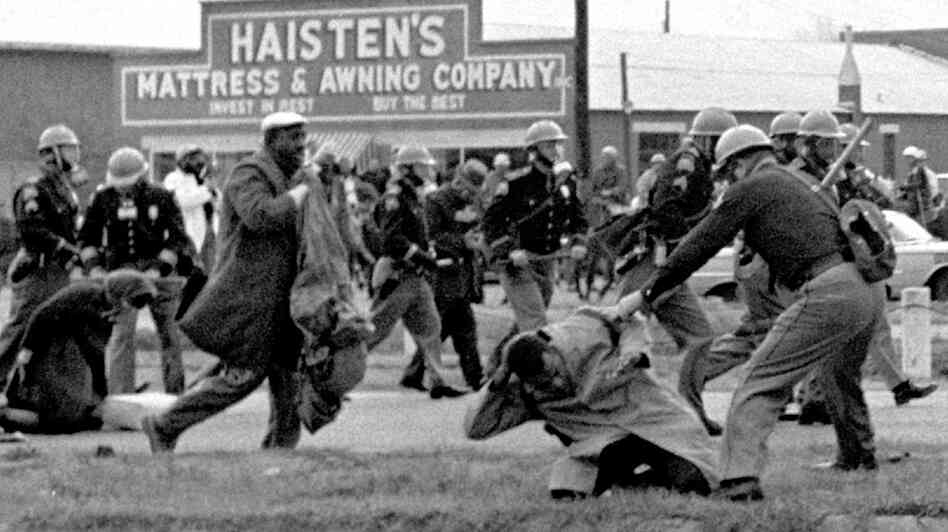
The New York Times’ Maureen Dowd, of all people, objects strenuously to the historical liberties taken by director Ava DuVernay in “Selma,” depicting the civil-rights movement led by the Rev. Dr. Martin Luther King Jr. during the mid-1960s. Ms. Dowd, who famously and unethically reversed the meaning of a quote by George W. Bush by replacing explanatory words with elipses, mainly complained about the movie’s depiction of Lyndon B. Johnson as “patronizing and skittish on civil rights.”
My last post focused on another work of historical fiction, by celebrated author Ken Follett. In his latest novel, “Edge of Eternity.” he depicts 1964 Republican presidential nominee Barry Goldwater as a racist, a characterization that doesn’t hold up on examination. He’s pretty tough on Johnson, too. At times, I find Follett exaggerating the peccadilloes of historical figures to justify the reactions of his fictional characters to the events and people surrounding them. Maybe that’s what DuVernay did as well. As Dowd recounts:
Many of the teenagers by me (in the theater where Dowd saw the movie) bristled at the power dynamic between the men. It was clear that a generation of young moviegoers would now see L.B.J.’s role in civil rights through DuVernay’s lens.
And that’s a shame. I loved the movie and find the Oscar snub of its dazzling actors repugnant. But the director’s talent makes her distortion of L.B.J. more egregious. Artful falsehood is more dangerous than artless falsehood, because fewer people see through it.
DuVernay told Rolling Stone that, originally, the script was more centered on the L.B.J.-M.L.K. relationship and was “much more slanted to Johnson.”
“I wasn’t interested in making a white-savior movie,” she said.
This has become almost a truism in recent dramatic depictions of the civil-rights movement of the 1950s and ’60s. Check out this fact-check of “The Butler,” a movie about a black man who served several presidents in the White House. He was a real person, named Eugene Allen, and he had significant and telling interactions with presidents from Eisenhower to Reagan. He was renamed Cecil Gaines for purposes of the movie, but like James Earl Jones’ “Jack Jefferson” (based on the life of turn-of-the-century boxer Jack Johnson) in “The Great White Hope,” and the name-changed characters in “Inherit the Wind,” about the Scopes trial over the teaching of evolution in 1925, there’s no doubt the people and events are grounded in historical reality.
One of the most egregious fabrications of “The Butler” was the creation of a second son who was killed in Vietnam, and the placement of the actual son in the thick of the civil-rights movement in the South. In reality, Mr. Allen’s son, who did serve in Vietnam, is alive today. He was not a Freedom Rider or involved in other demonstrations and civil-rights efforts that took place at the time.
Troublingly, both Follett and the authors of “The Butler” seem focused on the narrative that the government deliberately gathered up young black men and sent them into combat, causing a disproportionate death rate among black soldiers. The reality is more nuanced. Before the war and during its early days, blacks were greatly overrepresented in enlistments, and this was reflected in their casualty rates. But late in the war, the percentage of black service members who were killed and wounded in Vietnam declined precipitiously, apparently because the military was aware of the disproportion and worked to equalize hazardous duties:
In 1965 alone African Americans represented almost one-fourth of the Army’s killed in action. In 1968 African Americans, who made up roughly 12 percent of Army and Marine total strengths, frequently contributed half the men in front-line combat units, especially in rifle squads and fire teams. Under heavy criticism, Army and Marine commanders worked to lessen black casualties after 1966, and by the end of the conflict, African American combat deaths amounted to approximately 12 percent—more in line with national population figures. Final casualty estimates do not support the assertion that African Americans suffered disproportionate losses in Vietnam, but this in no way diminishes the fact that they bore a heavy share of the fighting burden, especially early in the conflict.
It seems to me most white Americans are troubled and embarrassed by the actions of white racists, especially those who lived in the 20th and 21st century and cannot be excused as men and women of their own times and places — a point often made in trying to explain how brilliant, honorable men like Thomas Jefferson and Robert E. Lee could own slaves and tolerate, or even defend, the institution of black slavery. That being the case, why is it necessary to make white people’s actions (and lack of opposition in many quarters) against blacks during the 1950s and ’60s even worse than they really were?

















